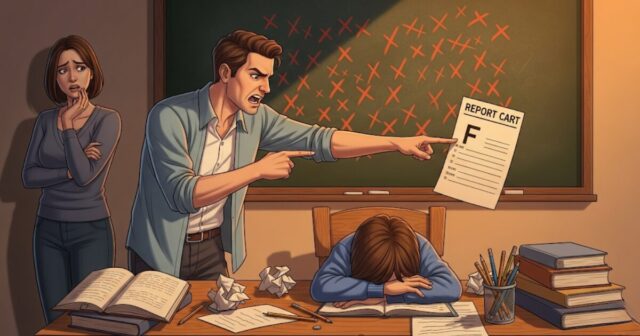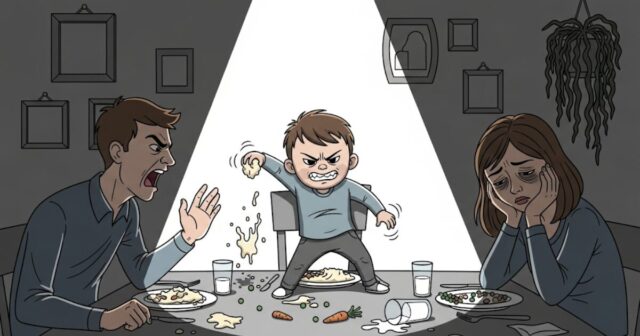Types Of Parenting That Spark The Worst Family Drama
By Trevor Fields
September 17, 2025 • Fact checked by Dumb Little Man
Let’s spill the tea: the types of parenting people choose can be the root of epic family drama. Parents often think drama is caused by the child’s behavior, but really, it starts with how the parents run the show. Drama doesn’t just pop up during teenage years—it brews quietly from early childhood. And trust me, when it explodes, everyone feels it.
Families live under the roof parents create. The parenting style sets the tone for rules, discipline, and even emotional connection. Children raised in a messy environment often carry that drama with them for years. Whether it’s screaming matches, slammed doors, or the silent treatment, the type of parenting approach used has everything to do with it.
The funny part? Many parents don’t even realize the problem. They say “every child is different” while ignoring that their own parenting style is fueling the fire. A parent who enforces strict rules without love is just asking for rebellion. A parent who gives too much freedom invites chaos. Balance is the key—but sadly, not every parent has it.
So, if family drama feels like a daily TV soap, the answer isn’t always therapy, more rules, or better grades. Sometimes, it’s simply rethinking the types of parenting styles used at home. Drama starts with the parenting techniques, and peace can start there too.
The Four Primary Parenting Styles Explained
Let’s get real: there are four primary parenting styles that pretty much sum up how parents operate. These styles explain why some families live in harmony while others feel like they’re stuck in constant battle. Parenting might look complicated, but once you understand these categories, things click.
The first is authoritative parenting, the balanced one. Then we have authoritarian parenting, which is all about control. Next, there’s permissive parenting, the “fun but chaotic” style. Finally, the quiet troublemaker: uninvolved parenting. These four main parenting styles make or break a child’s development. Children learn, adapt, and respond depending on which environment they grow up in.
A developmental psychologist might call them “frameworks of child rearing,” but let’s be real—they’re the blueprints for family drama or peace. Parents create the stage, and kids perform based on the rules, or lack of them. When one side leans too extreme, drama is guaranteed.
Understanding these different parenting styles doesn’t mean labeling parents as good or bad. It means realizing why your child’s emotional responses, behavior, and even academic challenges exist. Parents who pay attention can avoid negative outcomes and guide their children toward positive outcomes. Drama is optional—if parents know the script.
1. Authoritative Parenting Style: The Balanced Boss

Now let’s talk about the favorite child in this group: the authoritative parenting style. This one is often seen as the gold standard, and honestly, it deserves the crown. Why? Because authoritative parents know how to set high expectations while keeping love alive.
The magic is balance. Authoritative parents tend to mix discipline with emotional connection. They set clear expectations but also listen to the child’s feelings. Instead of enforcing rules with fear, they encourage cooperation. That means children raised in these homes learn natural consequences without feeling unloved or unheard.
Research shows this type of parenting style brings positive outcomes: higher self esteem, better emotional regulation, and stronger healthy relationships. A young child raised under authoritative parenting doesn’t just follow rules—they actually understand why the rules exist. That creates long-term positive parenting results, not short-term obedience.
And here’s the juicy part: drama is minimized. Sure, every family has arguments, but authoritative parenting allows parents to respond with empathy, not anger. Children learn effective coping strategies and develop emotional intelligence. It’s the recipe for self reliant, confident kids who don’t need therapy for their childhood later.
2. Authoritarian Parenting Style: Strict Rules on Steroids

Let’s be blunt: the authoritarian parenting style is like running your house as if it’s a boot camp. Authoritarian parents set strict rules, demand obedience, and rarely let a child’s opinions count. If you’ve ever heard “Because I said so,” that’s classic authoritarian parenting in action.
Now, sure, kids under this style usually behave in public. Teachers may think they’re angels. But behind closed doors? The drama is wild. Authoritarian parents tend to crush emotional connection, which leaves children raised in these homes with low self esteem. They might follow rules, but they grow up anxious, rebellious, or both.
The sad truth? This type of parenting approach creates negative outcomes like self esteem issues, mental health issues, and risky behaviors. The strict environment looks “successful” on the surface, but underneath it’s a ticking time bomb. No child’s happiness thrives under constant fear of punishment or harsh disciplinary methods.
So yes, you get order in the short term, but drama in the long term. The authoritarian parenting style doesn’t give children effective coping strategies, emotional regulation, or space to learn from natural consequences. Instead, it enforces control at the cost of the child’s emotional growth. Spoiler: the rebellion usually hits hardest during teenage years.
3. Permissive Parenting: The Indulgent Chaos

If authoritarian type of parenting is too strict, permissive parenting swings way too far in the other direction. Permissive parents hate conflict, avoid enforcing rules, and act more like friends than parents. They want their kids to love them so badly that they offer limited guidance.
It sounds fun, right? Unlimited screen time, ice cream for breakfast, zero chores. But children raised by indulgent parents often struggle with self control and emotional regulation. They may have strong emotional connection at home, but once authority figures outside step in—teachers, bosses, coaches—the drama is instant.
Permissive parenting creates children who expect to always get their own decisions without understanding consequences. That’s cute when they’re a young child, but not so cute when they face academic challenges or social relationships. Without boundaries, they grow entitled and unprepared for real life.
And let’s be real: permissive parenting doesn’t mean no drama. It means different drama. Instead of arguing about rules, the chaos shows up when the child’s behavior embarrasses the family, or when the child fails at responsibilities. Parents wanted peace, but what they got was long-term conflict.
READ MORE: Parenting Tips: 10 Things You Need To Understand About Your Child
4. Uninvolved Parenting: The Silent Disaster

Now for the most heartbreaking: uninvolved type of parenting. This is when uninvolved parents or an uninvolved parent basically disappear from their child’s life emotionally. Minimal nurturing, no parental support, and a neglect of the child’s basic needs. It’s not loud drama—it’s silent pain.
Children raised in this style often face mental health issues, academic challenges, and long-term self esteem issues. Early childhood under uninvolved parenting leaves scars that last into adulthood. Without emotional intelligence and healthy relationships, the child grows up struggling to trust anyone.
Here’s the kicker: drama in uninvolved parenting doesn’t happen through shouting or strict rules. It happens later, when the child acts out through risky behaviors, negative outcomes, or total withdrawal. The silence in the house might fool parents, but inside the child’s emotional world, there’s chaos.
Let’s not sugarcoat it. Uninvolved parenting creates one of the most damaging environments for a child’s development. Without emotional connection, clear expectations, or effective parenting techniques, the child becomes lost. Parents wanted an easy life, but instead they raised a child who feels invisible. That is drama with lifelong consequences.
The Clash of High Expectations and Child’s Emotions
Let’s talk about the drama that comes when parents hold high expectations but ignore a child’s emotional world. Yes, we all want kids to succeed, but there’s a fine line between motivating and suffocating. Parents who pile on pressure without emotional connection are basically setting the stage for meltdowns.
Children raised under these conditions may get good grades but also battle low self esteem. When parents create pressure without love, the child’s behavior becomes rebellious or withdrawn. The family dinner table turns into a stress-fest, where everyone feels tense instead of connected.
The real issue isn’t the high expectations—it’s how parents respond. Supportive expectations build resilience and effective coping strategies. Harsh, authoritarian expectations fuel risky behaviors and negative outcomes. A young child doesn’t just need to win spelling bees—they need to feel safe to fail without losing love.
Drama thrives when parents forget that success means more than academic success. Balancing clear expectations with emotional intelligence leads to healthy relationships, not constant fights. Push too hard without empathy, and the family becomes a pressure cooker ready to blow.
Academic Challenges and The Blame Game at Home

Here’s where things get spicy: when kids face academic challenges, parents often panic. Suddenly the parenting style gets exposed. Some parents clamp down with authoritarian type of parenting, doubling the strict rules. Others lean permissive, brushing it off with “It’s fine, you’ll do better next time.” Both create drama.
Children raised under constant academic stress often develop mental health issues, low self esteem, or resentment. Instead of solving the problem, parents escalate the conflict. The child feels judged rather than supported, and the household fills with arguments.
But guess what? Academic challenges are normal. What matters is how parents respond. Authoritative parenting, positive parenting, and gentle parenting approaches help children learn effective coping strategies. They turn failures into lessons, not battles. That’s how children learn resilience instead of fear.
Drama is guaranteed when grades become the measure of worth. Families that use healthy parenting techniques know that child rearing isn’t about report cards. It’s about building emotional intelligence, self control, and self reliant confidence that carries into the child’s life.
When Bad Behavior Becomes The Family Spotlight

Let’s be honest: nothing sparks family drama faster than bad behavior. Whether it’s backtalk, skipping chores, or teenage rebellion, the way parents handle it depends on their type of parenting style. And oh boy, some approaches pour gasoline on the fire.
Authoritarian parenting cracks down with harsh disciplinary methods, turning every mistake into a war. Permissive parenting does the opposite, ignoring boundaries and letting the chaos roll. Uninvolved parenting doesn’t even notice, leaving the child to spiral. Each of these fuels more conflict than calm.
Children raised under these styles often struggle with self control and emotional regulation. They act out because their needs for guidance, boundaries, and emotional connection aren’t being met. That behavior then becomes the headline drama of the family—stealing peace from everyone.
The solution? Authoritative parenting style with positive parenting elements. Clear expectations plus empathy. Parents enforce rules but with understanding. That way, children learn natural consequences without the yelling match. Families that handle misbehavior with balance avoid turning every slip-up into a full-blown crisis.
Why Authoritative Parenting Keeps The Peace
Among all the different type of parenting styles, authoritative parenting is the least likely to explode into daily drama. Why? Because it’s the only style that mixes discipline with love in a way kids actually respond to. Parents create rules, yes, but they also build emotional connection and listen to the child’s feelings. That balance is pure gold.
Authoritative parents hold high expectations, but they don’t crush a child’s happiness. They give parental support while still enforcing clear expectations. Children raised this way grow up with higher self esteem, emotional intelligence, and effective coping strategies. That’s why experts always say this is the best parenting approach.
Here’s the thing: families with authoritative parenting don’t avoid conflict entirely. Every young child argues at some point. The difference is how parents respond. Instead of screaming or ignoring, they talk, guide, and teach. That reduces bad behavior and builds long-term healthy relationships.
In short, authoritative parenting style is the drama shield. It allows children to learn natural consequences without constant punishment. It helps children tend toward academic success, emotional regulation, and close relationships. It’s not perfect, but compared to authoritarian parenting or permissive parenting, it’s the crown jewel.
5. Positive Parenting: Underrated But Powerful

If authoritative parenting is the star, positive type of parenting is the underrated gem. It’s all about building a supportive environment where children learn through love, guidance, and yes—clear expectations. Many parents think this sounds too “soft,” but let’s get real—it works.
Children raised with positive parenting often show higher self esteem, emotional intelligence, and healthier social relationships. They grow up with good self esteem because parents focus on emotional connection and parental support. Positive parenting encourages self reliant children who feel secure enough to make their own decisions.
And don’t mistake kindness for weakness. Positive parenting still enforces boundaries, but it does so without harsh disciplinary methods. Instead of punishing bad behavior, it focuses on teaching better choices. That leads to positive outcomes and fewer family meltdowns.
Drama is rare here because the foundation is strong. Parents respond with empathy, and children feel safe enough to express the child’s opinions. Families using positive parenting don’t need to shout—they thrive through trust and mutual respect. That’s a win for everyone.
6. Gentle Parenting: The Trendy Choice

If you’ve scrolled Instagram or TikTok, you’ve seen gentle parenting everywhere. It’s the shiny new approach that emphasizes patience, understanding, and respect for a child’s feelings. Sounds dreamy, right? And honestly, when done correctly, it can be amazing.
Gentle parenting avoids harsh disciplinary methods, choosing instead to guide through empathy. It’s basically positive parenting with extra attention on emotional regulation. Children raised this way usually build strong emotional intelligence, higher self esteem, and better healthy relationships. Parents create a home where emotional connection is the rule, not the exception.
But here’s my sassy truth: gentle type of parenting isn’t drama-proof. Without clear expectations, it can slide into permissive parenting. That means indulgent parents who want to avoid conflict end up creating long-term chaos. The key is balance—gentle doesn’t mean zero structure.
At its best, gentle parenting empowers children to be self reliant and confident while still respecting authority figures. It nurtures child’s development without constant yelling or punishment. Done wrong, it sparks family drama when the child assumes rules don’t apply. Done right, it’s one of the most effective parenting techniques out there.
How Children’s Development Reacts to Parenting
Here’s the reality check: every parenting approach shapes a child’s development in massive ways. You can’t escape it. Whether it’s early childhood or teenage years, the way parents act sets the tone for everything that follows. Some styles push kids toward positive outcomes, while others trap them in cycles of family drama.
Authoritative parenting tends to give children higher self esteem, stronger emotional regulation, and healthier social relationships. A young child raised under this style feels secure, learns natural consequences, and builds emotional intelligence. On the flip side, authoritarian parenting piles on strict rules, creating resentment and risky behaviors.
Permissive parenting allows indulgence without responsibility. Children raised here often stumble in academic challenges and struggle with self control. Meanwhile, uninvolved parenting? That’s where a child’s basic needs are ignored, leaving scars of neglect, poor health outcomes, and low self esteem. Each style rewires a child’s happiness, confidence, and future.
Bottom line: drama shows up when a child’s emotional world doesn’t align with their needs. If parents create clear expectations while giving emotional connection, children learn balance. Without that, you don’t just get family fights—you get lifelong negative outcomes. Parenting is powerful. The style you choose literally scripts your child’s life.
The Emotional Drama Behind Neglectful Parents
Now let’s get into the heavy stuff: neglectful parents. They don’t scream, they don’t hover—they simply disappear. Minimal nurturing, zero emotional connection, and no parental support. This isn’t a type of parenting, it’s absence. And the drama? It builds slowly, eating away at the child’s happiness.
Children raised by neglectful parents often face self esteem issues, mental health issues, and rocky social relationships. With no clear expectations or guidance, they don’t learn effective coping strategies. The lack of love doesn’t always cause loud fights, but the silent damage is worse.
A young child in this environment doesn’t just miss out on affection—they lose the foundation of trust. Without guidance, they slip into risky behaviors, negative outcomes, and often academic challenges. Parents think silence equals peace, but really, the child’s development suffers in every way.
The saddest part? Uninvolved parenting robs kids of emotional intelligence and healthy relationships. Instead of becoming self reliant, they grow up feeling invisible. Neglect might look drama-free in the moment, but the storm comes later in the child’s life—and it is devastating.
ALSO READ: Co-Parenting Isn’t Cute—But It Works
Why Many Parents Get it Wrong
Here’s the kicker: many parents don’t even realize their parenting techniques are the root of the drama. They think they’re being “loving” but actually fall into permissive parenting. Or they think they’re “responsible” but lean authoritarian. Misunderstanding your style is one of the biggest causes of family chaos.
Parents ignore how their actions impact a child’s development. When they enforce rules without emotional connection, children raised under this model feel crushed. When they avoid rules altogether, kids lack self control and stumble into academic challenges. Both extremes spell disaster.
Drama builds because parents don’t stop to reflect. They don’t ask whether their approach is creating healthy relationships or pushing their children toward negative outcomes. They just repeat what they saw growing up, or copy other parenting styles blindly, without adapting to their own child’s needs.
The truth? Parenting is not one-size-fits-all. But every style needs balance. Without clear expectations and emotional connection, family life becomes one long episode of conflict. The good news is that once parents recognize their style, they can shift toward authoritative parenting and spark positive outcomes.
Parenting Across Cultures and Ethnic Groups

Let’s not ignore it: parenting looks very different across ethnic groups and cultures. What feels like authoritarian parenting in one culture may be seen as respect for authority figures in another. Parenting isn’t just about psychology—it’s shaped by traditions, community values, and expectations that parents pass down.
For example, in some cultures, authoritarian parents are praised for discipline and order. Obedience is seen as a sign of respect, not a negative outcome. In others, gentle parenting or positive type of parenting is the standard, focusing on the child’s feelings, emotional connection, and supportive environment. Both can work—when balance is present.
The issue? Parents sometimes copy other parenting styles without considering what their own child needs. Children raised in one cultural setting may thrive with strict rules, while another child may require more emotional regulation and flexibility. A parenting approach that works in one community might spark drama in another.
Drama happens when parents ignore balance and context. Culture shapes the framework, but children learn best when love and clear expectations are combined. No matter the cultural lens, effective coping strategies, healthy relationships, and positive outcomes depend on meeting a child’s basic needs. Parenting may look different, but the fundamentals of child rearing never change.
How Parenting Affects Close Relationships at Home
Let’s be real—parenting doesn’t just shape grades and chores. It deeply affects close relationships within the family. Parents may think drama is just “kids being kids,” but often it’s the direct result of the parenting style used day after day.
Children raised under authoritarian parenting usually fear their parents instead of trusting them. That means less emotional connection and more resentment. On the flip side, permissive parenting creates indulgent chaos where boundaries are blurred. Kids might like the freedom, but long-term respect for authority figures disappears. Both approaches damage healthy relationships at home.
Uninvolved parenting has its own hidden disaster. With minimal nurturing and little parental support, the child feels invisible. That breaks trust and sets the stage for negative outcomes. Without strong family bonds, the child’s life feels disconnected, and drama takes over in silence.
Now compare that to authoritative parenting and positive parenting. Parents create a supportive environment with clear expectations and emotional intelligence. That mix builds self reliant kids who respect boundaries while still feeling loved. Families using this style avoid unnecessary conflict because emotional connection and trust hold everything together. Drama doesn’t vanish, but it becomes manageable instead of explosive.
Wrapping Up The Messy World of Parenting
Let’s be real: the four main parenting styles explain why some families thrive and others drown in drama. Authoritative parenting sparks positive outcomes with balance and warmth. Authoritarian parenting enforces control but often causes rebellion. Permissive parenting brings indulgence but creates chaos. And uninvolved parenting? That’s the silent killer of emotional connection.
Family drama isn’t random—it’s built on daily choices parents make. Children raised with parental support, emotional intelligence, and clear expectations grow into confident, self reliant adults. Children raised in negative environments struggle with academic challenges, mental health issues, and broken social relationships. Parenting literally scripts a child’s life.
Here’s the kicker: parenting doesn’t require perfection. It requires awareness. Parents who reflect, adjust, and create a supportive environment avoid negative outcomes. Parents who repeat poor parenting techniques invite endless drama. The difference is in the balance of discipline and love.
So yes, drama is avoidable. If parents commit to authoritative parenting or positive parenting, they build homes where children learn through natural consequences, trust, and effective coping strategies. That’s how families move from chaos to healthy relationships. And honestly? Isn’t that what every parent really wants?
Final Thoughts on Choosing The Right Parenting Approach

Choosing a type of parenting approach isn’t about copying a trend or being the “cool parent.” It’s about figuring out what truly helps your child’s development while keeping the household from turning into a battlefield. Parenting shapes not only childhood, but also long-term health outcomes and emotional intelligence.
Here’s the sassy truth: parents can’t escape responsibility. Whether they use gentle parenting, permissive parenting, or authoritarian parenting, their choices create a ripple effect. Children raised with high expectations and emotional connection thrive. Those without balance face negative outcomes, self esteem issues, and drama-filled homes.
The goal isn’t to eliminate all conflict. Even authoritative parents deal with tears and arguments. The difference is how parents respond. Do they enforce rules without compassion, or guide with clear expectations and empathy? That choice determines whether the child grows with good self esteem and healthy relationships—or with resentment.
At the end of the day, parenting is power. It can create close relationships, positive outcomes, and child’s happiness, or it can fuel drama for decades. Pick wisely. Your child’s life, your family’s peace, and even your own sanity depend on it.
UP NEXT: Charlie Kirk Dead? Here’s What Actually Went Down
Trevor Fields
Trevor Fields is a tech-savvy content strategist and freelance reviewer with a passion for everything digital—from smart gadgets to productivity hacks. He has a background in UX design and digital marketing, which makes him especially tuned in to what users really care about. Trevor writes in a conversational, friendly style that makes even the most complicated tech feel manageable. He believes technology should enhance our lives, not complicate them, and he’s always on the hunt for tools that simplify work and amplify creativity. Trevor contributes to various online tech platforms and co-hosts a casual podcast for solopreneurs navigating digital life. Off-duty, you’ll find him cycling, tinkering with app builds, or traveling with a minimalist backpack. His favorite writing challenge? Making complicated stuff stupid simple.


